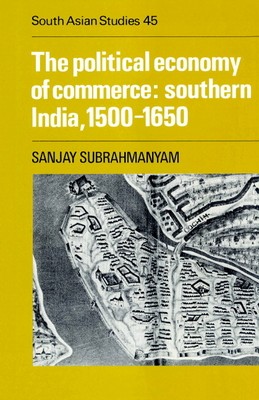
- We will send in 10–14 business days.
- Author: Sanjay Subrahmanyam
- Publisher: Cambridge University Press
- ISBN-10: 0521892260
- ISBN-13: 9780521892261
- Format: 16.1 x 20.9 x 2.6 cm, minkšti viršeliai
- Language: English
- SAVE -10% with code: EXTRA
The Political Economy of Commerce: Southern India 1500-1650 (e-book) (used book) | bookbook.eu
Reviews
Description
In The Political Economy of Commerce: Southern India 1500-1650 Sanjay Subrahmanyam explores the relationship between long-distance trade and the economic and political structure of southern India in the sixteenth and early seventeenth centuries. He questions the more traditional views that external demand was the force behind pre-colonial Indian economic growth or that external trade was insignificant in quantitative and qualitative terms compared with the vastness of the internal economy. Instead, Dr Subrahmanyam authoritatively demonstrates the interaction between south Indian developments and larger international processes within certain economic institutions - most notably the network of marketing villages, great coastal emporia and operations of revenue-farmers and 'portfolio' capitalists. This book is based on extensive and previously unused Portuguese and Dutch archival sources. Its secondary theme is to explore the relationship between the documentation used and the context within which it was generated, thus illuminating how Europeans and Asians reacted to one another.
EXTRA 10 % discount with code: EXTRA
The promotion ends in 23d.15:27:44
The discount code is valid when purchasing from 10 €. Discounts do not stack.
- Author: Sanjay Subrahmanyam
- Publisher: Cambridge University Press
- ISBN-10: 0521892260
- ISBN-13: 9780521892261
- Format: 16.1 x 20.9 x 2.6 cm, minkšti viršeliai
- Language: English English
In The Political Economy of Commerce: Southern India 1500-1650 Sanjay Subrahmanyam explores the relationship between long-distance trade and the economic and political structure of southern India in the sixteenth and early seventeenth centuries. He questions the more traditional views that external demand was the force behind pre-colonial Indian economic growth or that external trade was insignificant in quantitative and qualitative terms compared with the vastness of the internal economy. Instead, Dr Subrahmanyam authoritatively demonstrates the interaction between south Indian developments and larger international processes within certain economic institutions - most notably the network of marketing villages, great coastal emporia and operations of revenue-farmers and 'portfolio' capitalists. This book is based on extensive and previously unused Portuguese and Dutch archival sources. Its secondary theme is to explore the relationship between the documentation used and the context within which it was generated, thus illuminating how Europeans and Asians reacted to one another.


Reviews